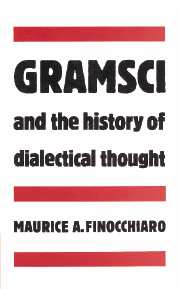Book contents
- Frontmatter
- Contents
- Preface and acknowledgments
- INTRODUCTION: AN APPROACH TO GRAMSCI
- Chapter 1 GRAMSCI'S CROCEAN CRITIQUE OF CROCE'S PHILOSOPHY
- Chapter 2 CROCE AND THE THEORY AND PRACTICE OF CRITICISM
- Chapter 3 GRAMSCI'S METHODOLOGICAL CRITICISM OF BUKHARIN'S SOCIOLOGY
- Chapter 4 BUKHARIN AND THE THEORY AND PRACTICE OF SCIENCE
- Chapter 5 GRAMSCI'S DIALECTICAL INTERPRETATION OF MACHIAVELLI'S POLITICS
- Chapter 6 GRAMSCI'S POLITICAL TRANSLATION OF HEGELIAN-MARXIAN DIALECTIC
- Chapter 7 HEGEL AND THE THEORY AND PRACTICE OF DIALECTIC
- Chapter 8 GRAMSCI AND THE EVALUATION OF MARXISM
- CONCLUSION: DIALECTICAL METHODOLOGY AND TEXTUAL CRITICISM
- Appendix: Concordance of critical edition and English translations
- Notes
- Bibliography
- Index
Chapter 5 - GRAMSCI'S DIALECTICAL INTERPRETATION OF MACHIAVELLI'S POLITICS
Published online by Cambridge University Press: 10 December 2009
- Frontmatter
- Contents
- Preface and acknowledgments
- INTRODUCTION: AN APPROACH TO GRAMSCI
- Chapter 1 GRAMSCI'S CROCEAN CRITIQUE OF CROCE'S PHILOSOPHY
- Chapter 2 CROCE AND THE THEORY AND PRACTICE OF CRITICISM
- Chapter 3 GRAMSCI'S METHODOLOGICAL CRITICISM OF BUKHARIN'S SOCIOLOGY
- Chapter 4 BUKHARIN AND THE THEORY AND PRACTICE OF SCIENCE
- Chapter 5 GRAMSCI'S DIALECTICAL INTERPRETATION OF MACHIAVELLI'S POLITICS
- Chapter 6 GRAMSCI'S POLITICAL TRANSLATION OF HEGELIAN-MARXIAN DIALECTIC
- Chapter 7 HEGEL AND THE THEORY AND PRACTICE OF DIALECTIC
- Chapter 8 GRAMSCI AND THE EVALUATION OF MARXISM
- CONCLUSION: DIALECTICAL METHODOLOGY AND TEXTUAL CRITICISM
- Appendix: Concordance of critical edition and English translations
- Notes
- Bibliography
- Index
Summary
Besides Croce and Bukharin, a third main source of intellectual stimulus for Gramsci in his Prison Notebooks is Machiavelli. The underlying theoretical problem now is no longer that of the religious and the scientific dimensions of Marxism, but rather that of its status as politics; to be more exact, the problem concerns the articulation of a Marxian or Marxist concept of politics. The connection between these two apparently disparate items will be seen in due course; for the moment, we may simply note that it should not be at all surprising if, in the process, Gramsci will have to construct his own reinterpretation of Machiavelli's politics, Marxian politics, and whatever intermediate concepts will be needed to bridge the gap.
A preliminary glimpse at the magnitude of the task may be had by examining a single note where Gramsci raises many of these issues before we proceed to a systematic analysis. This examination is especially important also because the note happens to be one of the best illustrations of how the new critical edition of the Prison Notebooks tends to superannuate previous interpretations and to move Gramsci scholarship onto a new plane. The note is the one on “politics as an autonomous science,” printed in the previous edition from Notebook 13, paragraph 10 (Q1568–70), and it begins as follows:
The first question that must be raised and resolved in a study of Machiavelli is the question of politics as an autonomous science, of the place that political science occupies or should occupy in a systematic (coherent and logical) conception of the world, in a philosophy of praxis.[…]
- Type
- Chapter
- Information
- Gramsci and the History of Dialectical Thought , pp. 123 - 146Publisher: Cambridge University PressPrint publication year: 1989

